In Mediterranean kitchens, olive oil has been the trusted companion for centuries, delivering flavor and nutrition to countless meals. Health-conscious consumers and epicureans alike are indulging in this flavorful sensation, banking on suspected bonus health perks that just might prove the icing on the cake. So, can olive oil really be a ally in the battle of the bulge?
Say goodbye to extra baggage – olive oil might just be the secret to svelte skin. A nutritious balance of foods provides the necessary foundation for optimal health, fitness, and happiness. Science says ditching the low-fat fad and going Mediterranean – with a healthy dose of olive oil – can be the smarter choice for losing weight. This may seem odd since olive oil is high in calories and fat.
Olive oil is like a good friend – it’s best enjoyed in small, savory doses. One tablespoon has 119 calories, so it’s important to watch portion sizes.
Slathering olive oil on your plate can lead to a feeling of fullness that stops you from going back for seconds. There’s more to this powerhouse food than meets the eye – its signature compounds come together to spark a fat-burning inferno that will leave you feeling lean and mean.
Let’s distill this down to the essential facts:
- Olive oil is more than just a tasty finishing touch for your meals – it can actually help with weight loss and weight management.
- So, you want to know a clever way to keep your appetite in check and your metabolic engine purring? Try incorporating a moderate amount of olive oil into your daily eats – it might just do the trick.
- The healthier choice is clear: using olive oil in place of other fats can significantly improve your overall well-being and weight loss progress.
Olive oil’s magic lies in its composition – a harmony of bioactive molecules that generate its prized flavor profile and fragrance.
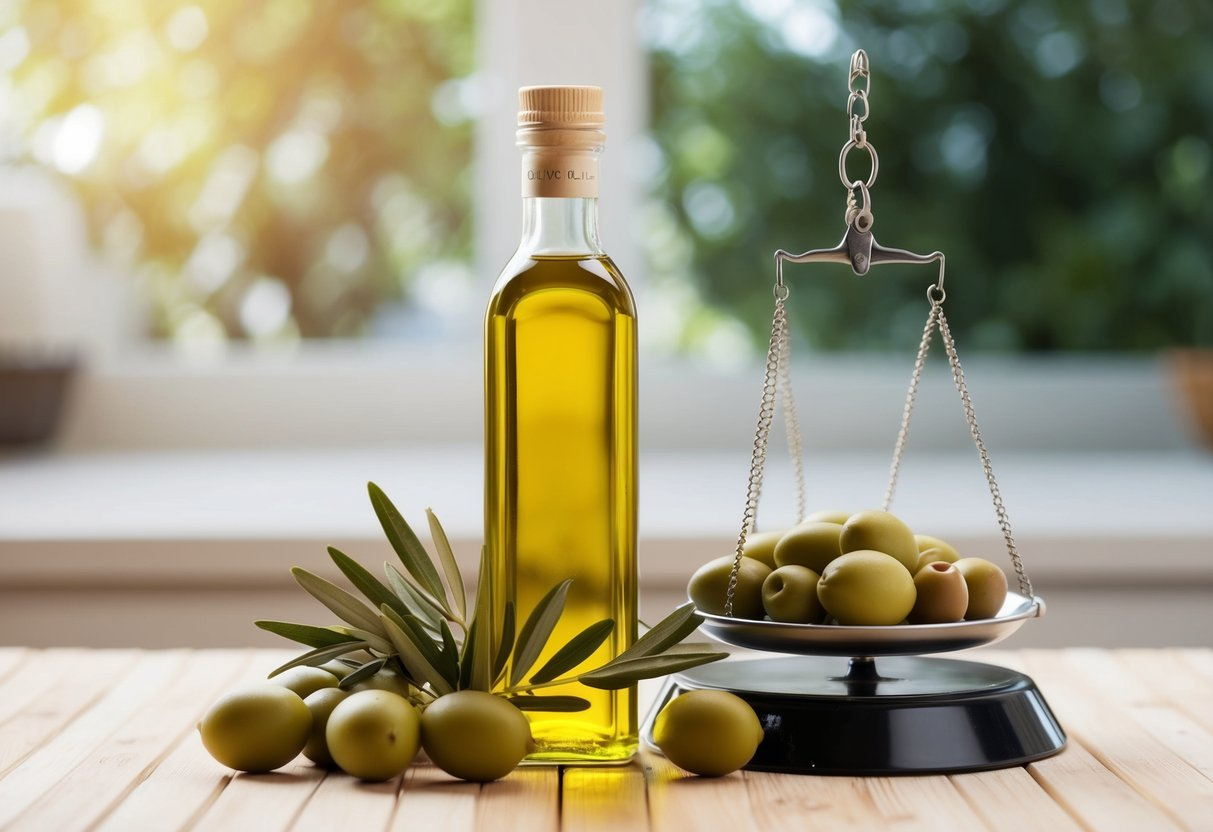
The health perks of olive oil can be attributed to a combination of powerhouse components that work together to support a slimmer waistline. Packed inside are fatty acids that help our bodies thrive, a rich supply of antioxidants that fight off damage, and essential vitamins and minerals that keep us going strong.
Monounsaturated Fatty Acids (MUFAs)
Olive oil is rich in monounsaturated fatty acids, particularly oleic acid. MUFAs make up about 73% of olive oil’s total fat content. This high MUFA content is linked to many health benefits.
Inside your body, a quiet yet potent ally exists in oleic acid, squelching the fires of inflammation and promoting a smoother path to healing. With better insulin sensitivity, the math becomes simpler: it’s a whole lot easier to stay at a healthy weight.
Different types of olive oil have varying MUFA levels. Extra virgin olive oil (EVOO) typically has the highest MUFA content. Virgin olive oil and refined olive oil have slightly lower amounts.
Antioxidants and Polyphenols
Olive oil contains powerful antioxidants called polyphenols. Rogue free radicals get busted by the-body heroes, specialists that keep our cells running smoothly by taking out the trash.
The main polyphenols in olive oil include:
- Oleuropein
- Hydroxytyrosol
- Tyrosol
EVOO has the highest polyphenol content. This is because it’s the least processed form of olive oil.
Not all antioxidants are created equal; polyphenols, inherent to plants, veggies, and fruits, possess exceptional abilities to neutralize free radicals and foster robust health. By tackling inflammation and stepping up metabolism, it can play a significant role in weight management. As an extra perk, they may curb your appetite.
Vitamin E and Other Nutrients
Olive oil is a good source of vitamin E, a fat-soluble antioxidant. One tablespoon of olive oil provides about 1.9 mg of vitamin E, or 13% of the daily recommended intake.
Your body has a potent ally in Vitamin E, which fortifies your immune defenses and gives your skin a vibrant appearance. There’s an added advantage: this could help tone down inflammation too.
But that’s not all – olive oil also happens to be a treasure trove of lesser-known nutrients that bump up its already considerable health perks.
- Vitamin K
- Squalene
- Beta-carotene
These nutrients, while present in smaller amounts, contribute to olive oil’s overall health benefits. MUFAs and polyphenols join forces to fortify bodily functions, and there’s evidence they might also lend a hand with weight management.
Olive Oil in a Balanced Diet

Olive oil plays a key role in healthy eating patterns. Two crucial elements – fats and nutrients – come together in perfect harmony, empowering you to take control of your weight management journey.
Healthy Fats Versus Saturated Fats
Olive oil contains mostly monounsaturated fats, which are healthier than saturated fats. Getting a grip on bad cholesterol just got a whole lot easier, thanks to these heroic fats. Replacing butter or lard with olive oil in cooking may improve heart health.
And the benefit that really stands out? The antioxidants in olive oil, which calmly and quietly tackle inflammation head-on. Broad-spectrum wellness is within reach with this holistic approach. Using olive oil doesn’t cause weight gain when part of a balanced diet.
Role of Olive Oil in the Mediterranean Diet
The Mediterranean diet features olive oil as a main fat source. By sticking to this eating style, you’ll be setting yourself up for a healthier, happier you – and weighing less is just the cherry on top. People in Mediterranean countries often use olive oil for cooking and as a salad dressing.
When olive oil meets vegetables, magic happens – their flavors mingle, and a whole new world of taste opens up. Healthy eating becomes second nature when you take control of your diet. Fresh from the Mediterranean, this diet loading up on whole grains, fish, and a dash of wine in moderation.
Calorie Intake and Weight Control
Olive oil is high in calories, like all fats. But it can still be part of a weight loss plan. The key is using the right amount. Add a dash of olive oil to your meals and suddenly they’re more filling and flavorful.
The extra challenge becomes getting enough, not too much. Some studies suggest olive oil might boost metabolism . This fat-burning helper kicks your metabolism into high gear.
Drizzling olive oil on salads or using it to cook vegetables adds flavor without many extra calories. Simplifying healthy eating decisions makes the process a whole lot smoother.
Rich in healthy fats, antioxidants, and micronutrients, olive oil takes center stage when it comes to pinpointing a nutritional powerhouse that genuinely supports a healthy lifestyle.
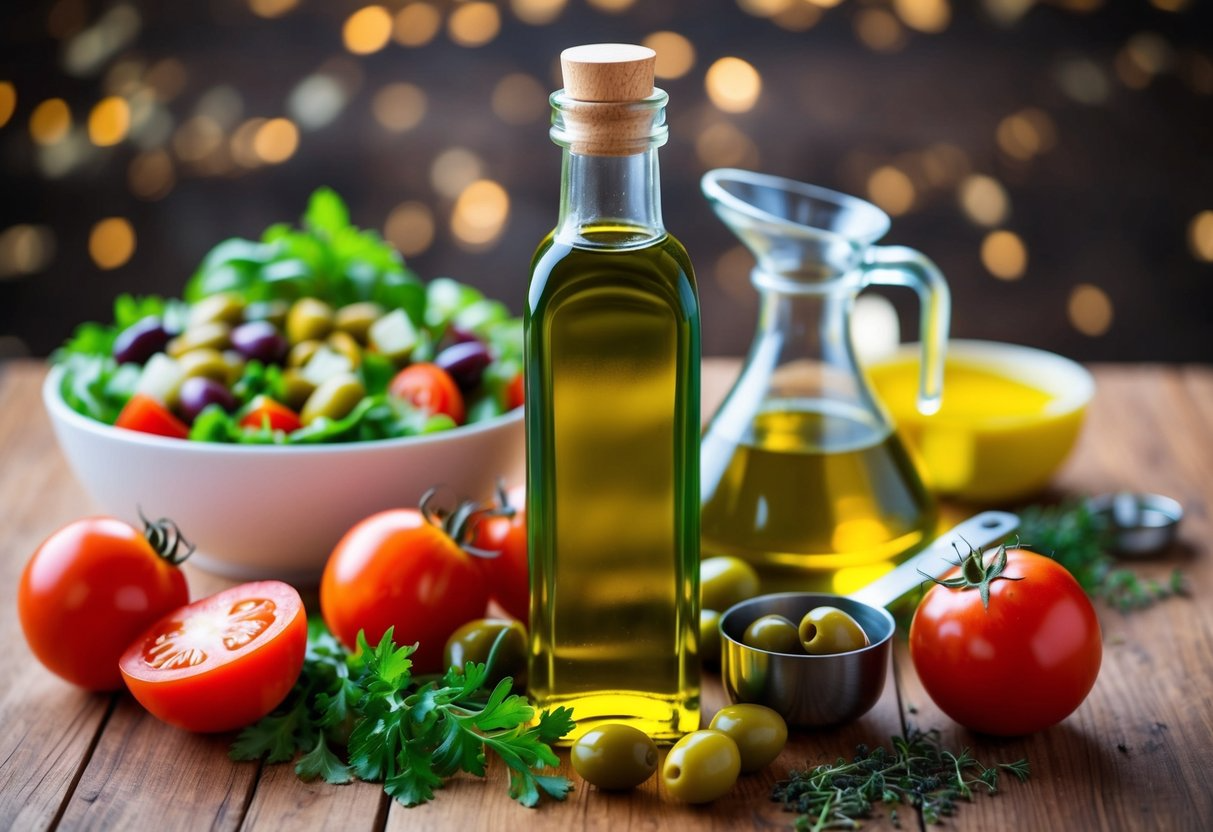
A slew of advantages come packaged with olive oil, a heroic hero of healthy living. Bright spots exist for advancements to be made. Strong heart, strong life – that’s the simple truth. By taking control of our heart health, we’re investing in a brighter, healthier future. Say goodbye to swollen joints and fluctuating blood sugar – you’ll feel a welcome reprieve from both.
Heart Health and Blood Pressure
Olive oil is good for your heart. Hold on to your seat – this package holds some fantastic surprises. Fats that fuel your body and antioxidants that shield it – the ultimate combo. Building a shield against heart disease starts with these healthy habits. Bad cholesterol doesn’t stand a chance against these compounds, which actively work to bring levels down.
Eating olive oil regularly may reduce the risk of heart attacks and strokes. There’s an added advantage – you may find your blood pressure coming down. For a heart that’s strong and healthy, this one element is surprisingly important.
Research has unearthed a promising trend: swapping out other fats for olive oil may actually cut your risk of heart problems, breathing new life into the old adage “an ounce of prevention.” Think tiny steps, not giant leaps: even the smallest adjustments to your daily diet can add up to make a big difference.
Anti-Inflammatory Effects
Olive oil has strong anti-inflammatory properties . This anti-swelling power can visibly reduce bloating in no time.
The main anti-inflammatory compound in olive oil is called oleocanthal. Imagine ibuprofen’s versatility, now apply that to this – it’s a pretty effective pain-relieving combination.
You’ll rarely find a disease that doesn’t have chronic inflammation hiding in the shadows, pulling the strings. Diabetes, arthritis, and specific cancers threaten to disrupt life’s rhythms, taking a heavy toll on those affected. When it comes to fending off disease, every little bit counts – and the inflammation-busting potential of olive oil might just be the protective shield we need.
Olive oil lovers, rejoice! Consuming this tasty oil on a regular basis can have a significant impact on your overall well-being. Protecting cells from damage is just the beginning – slowing down the clock on aging is the ultimate bonus.
Regulation of Blood Sugar and Diabetes
Olive oil can help control blood sugar levels. Whether you’re living with diabetes or fighting to avoid it, this brings a welcome upside.
Boosting insulin sensitivity may be as simple as adding oil to your diet. As a direct result, insulin is more effective at doing its job, leading to a drop in blood sugar levels. Blood sugar management gets a boost, as it absorbs and processes sugars at a slower rate, ensuring a smoother ride after meals.
Olive oil’s presence at the table means a slower digestive pace for your meal. This leads to a more gradual rise in blood sugar. You’ll be protecting your health for the long haul, with a decreased likelihood of type 2 diabetes emerging as a consequence.
For those who already have diabetes, olive oil can be part of a healthy diet plan. Sugar regulation is just one of the potential benefits – it may also lower your risk of complications.
Weight Management and Olive Oil
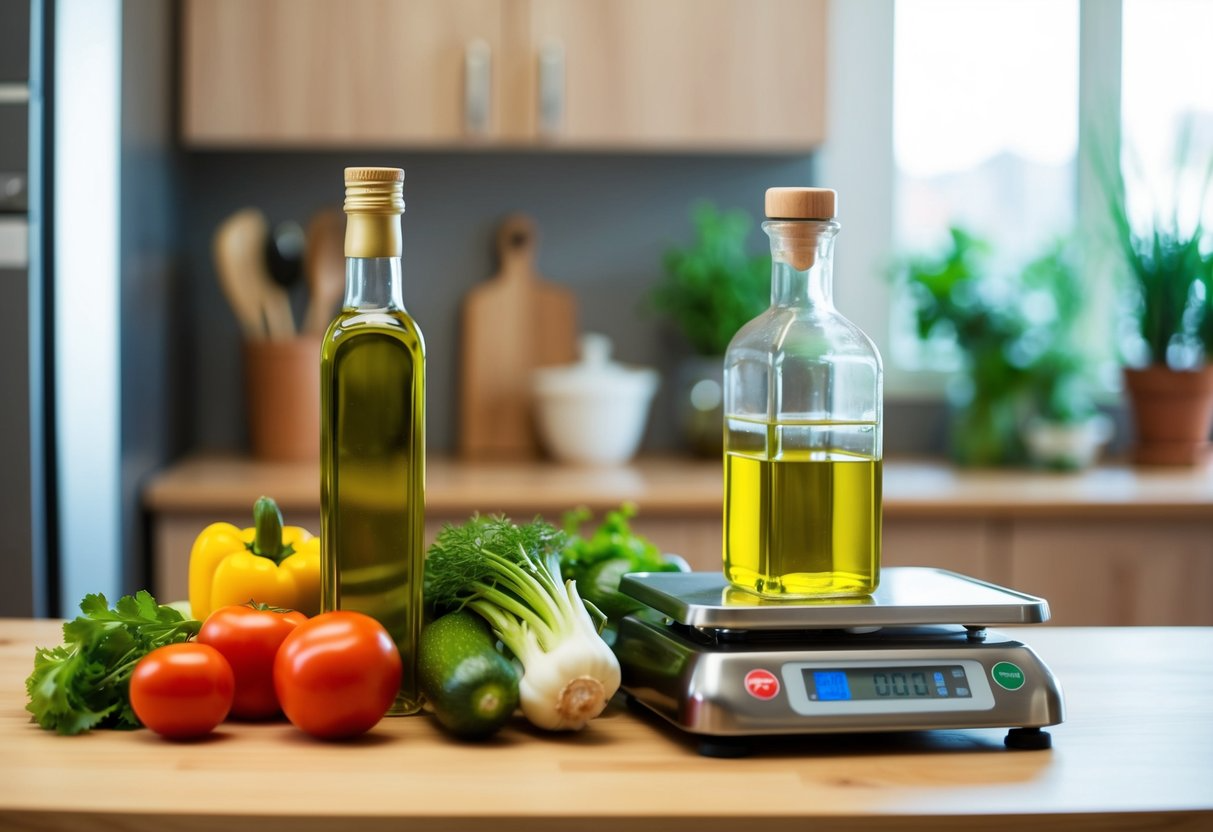
Olive oil can play a helpful role in weight management. It’s the unsung hero that keeps you feeling full, your metabolism revving, and your blood sugar in perfect harmony. It’s a compound effect – several key elements conspire to affect our weight, for better or for worse.
Olive Oil’s Impact on Satiety
Olive oil helps people feel full after eating. This can lead to eating less overall. The monounsaturated fats in olive oil slow digestion. This keeps food in the stomach longer.
Olive oil also triggers hormones that signal fullness to the brain. These hormones include cholecystokinin and peptide YY.
Adding olive oil to meals may reduce snacking between meals. This can help control total daily calories. A striking difference was observed in people who switched to olive oil: they slashed their daily calorie intake by a whopping 176 calories.
Fat Burning and Metabolism
Olive oil may help the body burn fat more efficiently. Buried within this ingredient are certain compounds that quietly amp up your metabolic rate.
The main fat in olive oil is oleic acid. This fat seems to increase the activity of genes involved in burning fat. Olive oil also contains phenols that may increase fat burning.
Some research suggests olive oil could help reduce body fat. A surprising connection was made between olive oil consumption and weight loss: those who incorporated it into their diet saw a significant drop in both weight and body fat.
However, olive oil is still high in calories. Did you know that excess can quite literally tip the scale against you? Moderation is key.
Insulin Sensitivity and Fat Storage
Olive oil may improve how the body responds to insulin. Your weight and fat storage are direct casualties when this factor comes into play.
Imagine glucose sneaking into cells with ease – that’s what happens when insulin sensitivity gets a boost. This reduces the amount of sugar in the blood. With reduced sugar intake, your body begins to reassign its fat storage duties.
Olive oil’s anti-inflammatory effects may improve insulin function. The path to a healthy weight just got a little clearer – and this discovery is the beacon. One of the biggest wins in the fitness journey is shedding those extra pounds around the middle – and feeling like a new person. What starts as a faint notion slowly grows into a demonstrable truth.
Replacing other fats with olive oil may lead to small decreases in body fat. This is especially true for fat around the waistline.
When it comes to getting the most bang for your buck, olive oil delivers. From skincare to cleaning, its everyday applications are practically endless.
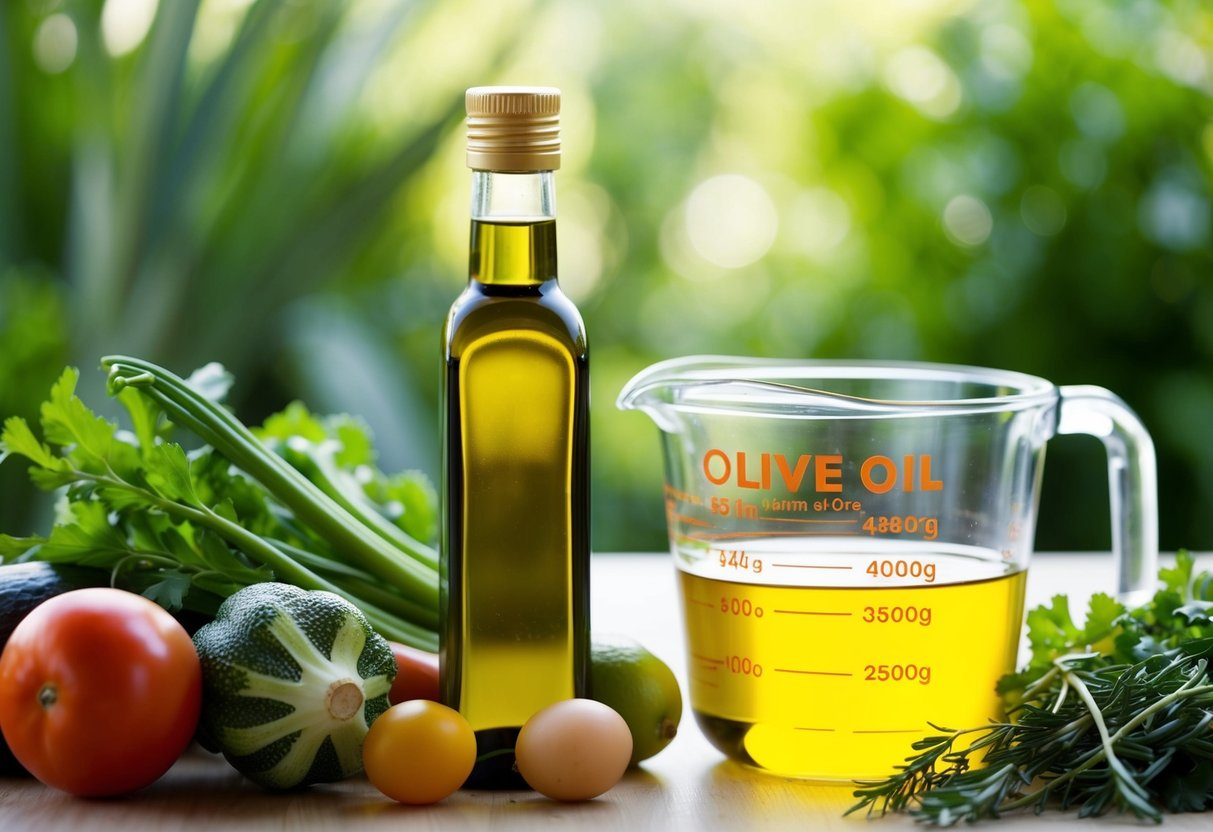
Think olive oil is just for cooking? Think again! This culinary Swiss Army knife can elevate everything from bread dipping to baked goods. Flavorful food can have an added bonus: it’s good for you too.
Incorporating Olive Oil into Meals
Olive oil can be used in many dishes. Flip and stir your way to a delicious dinner – it’s perfect for sizzling up veggies and proteins alike.
For a simple yet satisfying meal, serve this sauce over cooked pasta – or take it to the next level by whipping up a batch of creamy pesto.
For baking, olive oil can replace butter in some recipes. Give your baked goods a healthy makeover with this genius substitution that’s about to become your new best friend.
Olive oil works well for roasting vegetables. Toss cut veggies with olive oil and seasonings before roasting in the oven.
Olive Oil as a Salad Dressing
Olive oil makes a tasty salad dressing . Mix it with vinegar or lemon juice for a simple vinaigrette. The secret to making any meal unforgettable is a dash of creativity – in the form of fresh herbs and spices, of course!
To make a basic dressing, use 3 parts olive oil to 1 part acid (like vinegar).
Whisk together and add salt and pepper to taste.
For a creamy dressing, blend olive oil with Greek yogurt. This creates a rich texture without heavy cream.
Cooking with Different Types of Olive Oil
Extra virgin olive oil is best for cold uses like salad dressing. It has a low smoke point, so it’s not ideal for high-heat cooking.
Light olive oil works well for frying and sautéing. It has a higher smoke point and a milder flavor.
For baking, use a mild-flavored olive oil. This prevents the olive taste from overpowering your baked goods.
When pan-frying, choose an olive oil with a high smoke point. Burning oil is a non-issue thanks to this helpful preventive measure.
Considerations for Consuming Olive Oil
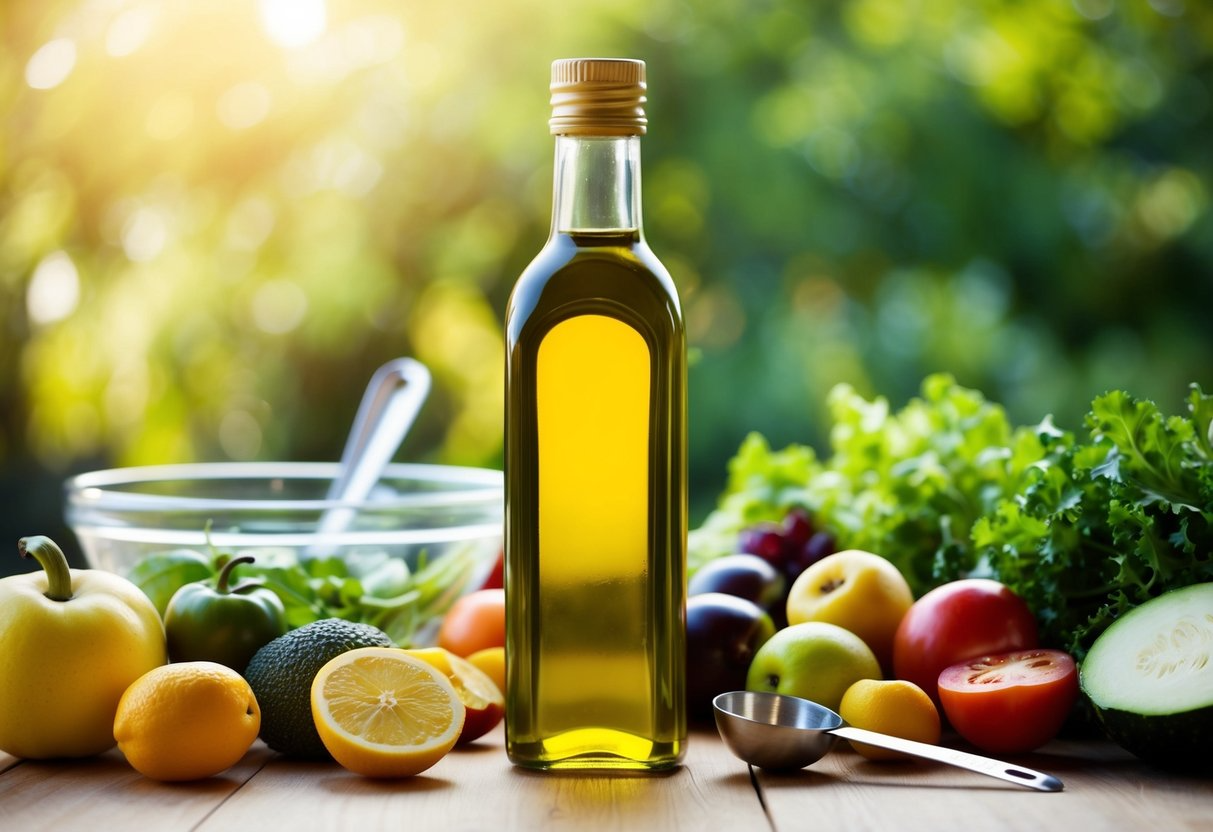
Olive oil can be a healthy part of a balanced diet. With medication in the mix, using the right products in the right amounts becomes a high-stakes balancing act that requires some serious know-how.
Daily Amounts and Calorie Considerations
Olive oil is calorie-dense. One tablespoon contains about 119 calories. It’s not about deprivation, but learning to savor everything in proportion – that’s the real trick to weight management.
Most adults can include 1-2 tablespoons of olive oil daily as part of a healthy diet. The funds total up to A certain type of fat deserves a big round of applause – it does our bodies a whole lot of good. minimal extra fat is the goal here
Replacing other fats with olive oil may help control weight. A surprising finding emerged when scientists looked at men who traded in their old fats for ones rich in monounsaturated goodness, like olive oil. My body’s undergone a welcome transformation – I’ve got a leaner, lighter physique now. Even with calorie intake staying put, something was amiss.
To avoid weight gain, use olive oil in place of less healthy fats rather than adding extra oil to your diet.
Quality and Types of Olive Oil
Extra virgin olive oil (EVOO) is the highest quality option. This olive oil is made from only the best: purely cold-pressed olives, free from any chemicals or heat processing.
EVOO has the most antioxidants and flavor. It’s best for salad dressings and low-heat cooking.
Virgin olive oil is also good quality, but with slightly lower standards than EVOO.
Regular olive oil is refined and has fewer nutrients. You can push it to the limit – blaze the stovetop or bake at 500 degrees – it’s engineered to take the heat.
When buying olive oil, look for dark glass bottles to protect it from light. Check for a harvest date and use within 12-18 months for best quality.
Possible Interactions with Medications
Olive oil may interact with some medications. Fat-soluble vitamins and certain medications get an absorption boost thanks to its ability to enhance nutrient uptake.
Blood thinner users, beware: extra vigilance is a must. Olive oil’s vitamin K content may affect blood clotting.
Diabetics should monitor blood sugar when adding olive oil to their diet. Insulin sensitivity could get a significant push in the right direction.
Those on blood pressure medications should consult their doctor. The effects of these medications might get a boost from olive oil.
Frequently Asked Questions
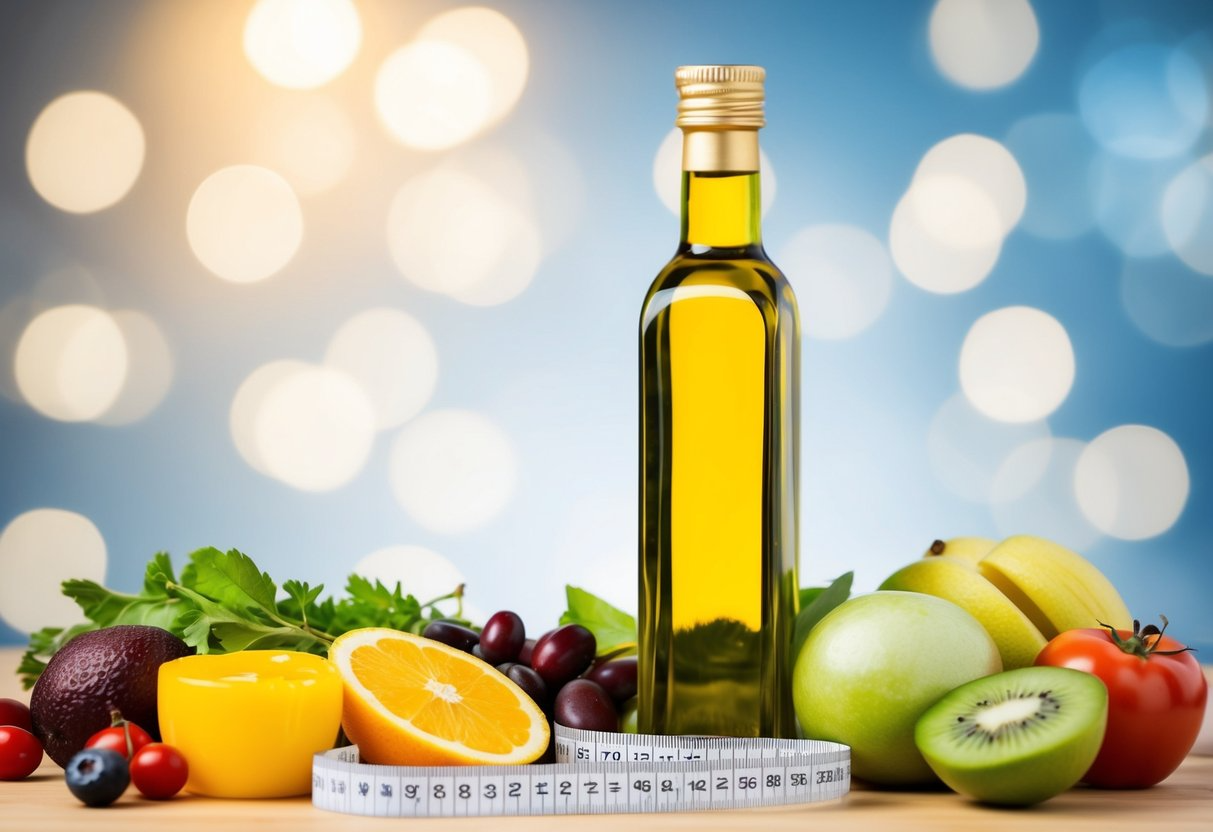
People often have questions about using olive oil for weight management. So, you’ve got questions about olive oil and its benefits – we’ve got science-backed responses that will set the record straight and help you make informed choices.
Shedding pounds can be a battle, but did you know that olive oil might just be the secret weapon you’ve been searching for?
The most effective way to use olive oil for weight management is to replace unhealthy fats with olive oil in your diet. Use 1-2 tablespoons per day in cooking or as a salad dressing.
Pair olive oil with a balanced diet rich in fruits, vegetables, whole grains, and lean proteins. Cut calorie intake and what do you get? A chance to load up on the good stuff, that’s what. This approach makes it happen.
Can consuming olive oil contribute to the reduction of belly fat?
Olive oil may help reduce belly fat when used as part of a calorie-controlled diet. Monounsaturated fats are like a medication for your body – they help speed up your metabolic rate and soothe inflamed areas.
Regular exercise combined with olive oil consumption may enhance fat burning, especially around the midsection. However, spot reduction is not possible, so overall weight loss is key.
What are the potential effects of taking olive oil regularly on weight loss?
Regular olive oil consumption can support weight loss efforts in several ways. Give this method a shot; it might be the solution you’re looking for. Hold hunger at bay. With its filling properties, you’ll find yourself feeling fuller for longer, reducing those pesky cravings.
Olive oil can also boost metabolism slightly. Health tends to flourish when inflammation is kept in check, and as a nice side effect, it can also give your weight loss efforts a helpful nudge.
Which type of olive oil is considered best for aiding in weight loss?
Extra virgin olive oil is considered the best type for weight loss. It is the least processed form and retains the most beneficial compounds.
Extra virgin olive oil is off the charts when it comes to polyphenols and antioxidants, outdoing other types of olive oil in both departments. Focusing on these essential nutrients can have a profound impact on your entire system, from head to toe – and a lower number on the scale might just be the cherry on top.
Are there specific times during the day when consuming olive oil could be more beneficial for weight management?
Consuming olive oil with meals can increase feelings of fullness. Eat smart and you’ll find your daily calorie count dwindling naturally.
Some people find taking a tablespoon of olive oil before meals helps curb appetite. Others prefer using it in cooking or as a dressing at lunch or dinner.
How does incorporating olive oil in a diet compare with other weight loss methods?
Incorporating olive oil is not a standalone weight loss method, but it can complement other healthy habits. Calorie control is just the starting point – the real benefits lie beyond that.
Unlike extreme diets, using olive oil supports sustainable eating patterns. For a winning weight management strategy, this energy-boosting food is the ace up your sleeve, loaded with the wholesome fats and nutrients your body relies on to thrive.